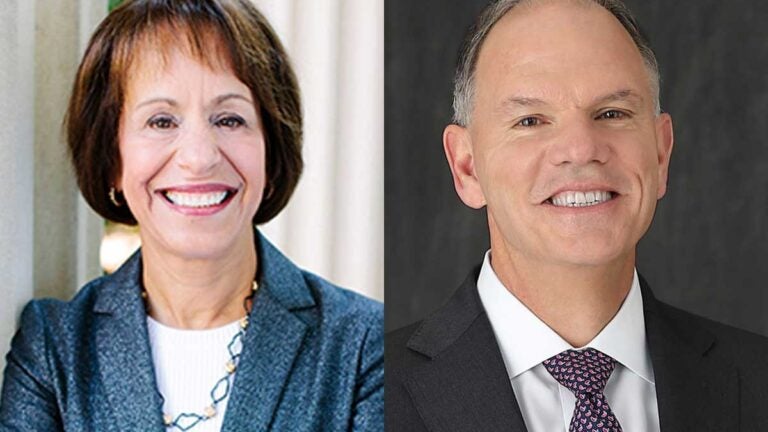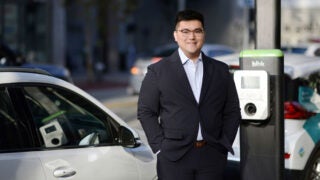
USC President Carol L. Folt and USC Marshall Dean Geoffrey Garrett. (Photos/Courtesy of the University of North Carolina at Chapel Hill and Geoffrey Garrett)
What’s ahead for the U.S. economy after the pandemic? President Folt and Dean Garrett discuss
USC Marshall’s new dean, Geoffrey Garrett, sits down for a conversation with President Carol L. Folt — and COVID-19 isn’t far from their minds.
https://youtu.be/NyKwGjX5f6c
Despite moving cross-country and starting a new job during a pandemic, Geoffrey Garrett found himself in familiar territory when he became dean of the USC Marshall School of Business last month — in both profession and location.
Garrett taught at USC from 2005 to 2008 and most recently served as dean of the Wharton School at the University of Pennsylvania. He’s already started using that experience to help implement innovative courses and ideas at USC Marshall.
“I think we need to show our students and the world two things: We need to show them that there really is a benefit to the rigor and the discipline that academic training and academic expertise brings to the table, but that’s also got to be really relevant,” Garrett said.
Garrett sat down with USC President Carol L. Folt in the latest video in her “We Are SC” series of conversations with university leaders. Folt wanted to discuss the state of the economy and hopes for the future with one of USC’s newest deans.
“He’s an expert in global economics, politics, business and management, and I am just delighted to have the chance to talk with Geoff about the global economy in this turbulent period, and a bit about where he hopes to take the Marshall School,” Folt said.
Folt and Garrett discuss the pandemic’s impact on the economy
The two talked about his previous experience with four different business schools, his plans for Marshall, his experiences as a political economist and his reflections on how the COVID-19 pandemic has impacted the national and global economies. Garrett and Folt spent a large portion of the discussion on the U.S.’s response to the pandemic compared to the rest of the globe.
“With respect to the global economy, I think the headline as of last week is that the U.S. second quarter of 2020, through the end of June, is the deepest recession the U.S. has experienced since the Great Depression 90 years ago,” Garrett said. “That’s extraordinary, but because the pandemic is unprecedented, we don’t really know how long the recession will last and what recovery will look like.”
We need to empower more people to take advantage of the digital opportunities and not just be disrupted by them.
Geoffrey Garrett
Garrett characterized the current state of the economy with three observations. First, the rise of technology has made online communication easier.
“How could we have even gotten through the pandemic as well as we have without things like Zoom video conferencing or Amazon being able to deliver so much to our homes?” he asked.
His second observation was the clear challenge facing anyone in dense or mobility businesses like hotels, airlines and schools. Finally, he said that unlike the recession of 10 years ago, the U.S. will not lead the global economy out of the current pandemic-fueled situation.
“We’ll follow just because the virus obviously is lingering longer in America,” Garrett said. “China has started its recovery already, and that wasn’t the case 10 years ago when the U.S. recovered first and really brought the rest of the world along with it.”
How will the U.S. economy bounce back?
The conversation eventually shifted to how the U.S. economy can get back on track. Garrett subscribes to a slightly different model than many economists: As opposed to a V-shaped model with a rapid descent and recovery, or an L-shaped model with a rapid descent and flatline, Garrett endorses what he called the “Nike swoosh.” In this model, there is a pretty straight and steep decline — one we’ve experienced in the last several months and Garrett said will probably go on for a couple more months — followed by a gradual recovery.
Throughout all this, though, Garrett foresees an increase is the level of innovation, which he said had been trending upward and was only accelerated by the crisis.
“We need to empower more people to take advantage of the digital opportunities and not just be disrupted by them,” he said. “It’s always been a complex story and I think that’s going to continue after the pandemic, because the pandemic on lots of dimensions is accelerating big changes that were already happening in society.”
It’s that empowerment and willingness to accept the big changes and move forward that Garrett wants USC Marshall students to take away from their time at the school. These changes can range from technology to crisis management and diversity.
“I want all of our students to be leaders, but the leadership challenges today are just so much bigger than they’ve been in the past, leading during a crisis, leading under uncertainty and then leading in diversity,” he said. “Those are just going to be core things that we need not only our students to understand, but we need to empower them with so that they can become leaders.”



